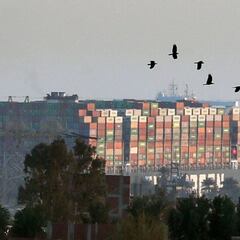Colonial Pipeline: Which states are suffering gas shortages and what has caused it?
A cybersecurity attack forced one of the most relied upon gas pipelines in the US to halt operations, leaving seven states vulnerable to a “supply crunch.”


For years cybersecurity experts have raised concerns that the nation’s electrical grid and fuel infrastructure could be vulnerable to cyber-attacks. These fears became a reality last week when an attack on the Colonial Pipeline, which provides forty-five percent of the fuel consumed on the east coast, led to the halting of operations.
On 9 May, President Biden announced a state of emergency. The attack has impacted seven states, four of which -- Florida, Georgia, North Carolina, and Virginia -- have announced a state of emergency of their own. Taking this action allows for better coordination between state and federal agencies to address the issues faced as a result of the shutdown.
The states impacted by the shutdown are Florida, Georgia, North Carolina, Virginia, South Carolina, Tennessee, and Alabama. The Secretary of Energy, Jennifer Granholm stated that the government is hoping that the pipeline’s full operations will be restored by the end of this week.
One reason we keep getting hacked? America has a huge lack of cyber security professionals. That’s why Congress needs to pass my bill, the New Collar Jobs Acts, to incentivize people to enter the cyber career field. The Colonial Pipeline hack is just the tip of the iceberg. https://t.co/rEDiXyFkdy
— Ted Lieu (@tedlieu) May 11, 2021
In a press conference on the matter, Sec. Granholm informed the media that “About 70 percent of the supplies of North Carolina, South Carolina, Tennessee, Georgia, and especially southern Virginia are impacted the most.” During her remarks, the Secretary noted that these areas are particularly vulnerable as they do not receive gas from many other sources. However, the government wants those in these states to understand that this is only a “supply crush” not a “gasoline shortage” and asks that people do not hoard because the flow of gasoline to these states should reach normal levels soon.
Who is responsible for the attack?
On 10 May, the FBI confirmed: “that the DarkSide ransomware is responsible for the compromise of the Colonial Pipeline networks.” The DarkSide group released a bizarre statement taking responsibility for the attack and vowing to be more careful to not create “social consequences” in the future, “Our goal is to make money, and not creating problems for society. From today we introduce moderation and check each company that our partners want to encrypt to avoid social consequences in the future.”
The federal law enforcement agencies investigating the group and the attack have yet to provide any additional information to the public. The BBC has reported that there are possible connections to Russia “as their software avoids encrypting any computer systems where the language is set as Russian.”
What has the federal government done in response to the attack?
Related stories
The Secretary of Homeland Security, Alejandro Mayorkas highlighted that the security of the nation’s infrastructure is only as strong as its weakest link. In the coming weeks and months, the department will focus on identifying where the weaknesses exist and coordinate with the private sector to enhance their security so they are less vulnerable to these sorts of attacks.
The White House and Administration are working around the clock to address the Colonial Pipeline shutdown and get fuel to the communities that need it. Here’s what we’ve done so far:https://t.co/Zf3KyzRiZp
— Jen Psaki (@PressSec) May 12, 2021
As a part of the federal emergency declaration enacted by President Biden, the federal response includes the establishment of an interagency working group to monitor and respond to the situation. This group is monitoring the fuel supply across the states impacted and will work with state and local officials to boost the logistical capacity of fuel movement until the pipeline reaches normal operation levels. In addition, to a variety of other measures, the administration is working to identify places where railways could be used to transport fuel to the areas impacted and has mandated that as the pipeline regains its capacity it sends fuel to the areas with the greatest need.

